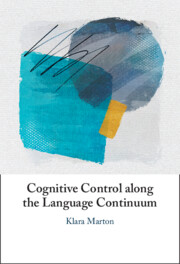Book contents
- Cognitive Control along the Language Continuum
- Cognitive Control along the Language Continuum
- Copyright page
- Contents
- Figures
- Acknowledgments
- Introduction
- Chapter 1 The Language Continuum
- Chapter 2 Cognitive Control
- Chapter 3 Methodological Issues
- Chapter 4 The Effect of Age on First Language Acquisition, Second Language Learning, and Cognitive Control Development
- Chapter 5 Associations between Language Ability, Language Proficiency, and Cognitive Control
- Chapter 6 The Impact of Language Input on Cognitive Control
- Chapter 7 Cognitive Control and Social Context of Language Use
- Chapter 8 Processing Speed and Cognitive Control
- Chapter 9 Cognitive Training and Language
- Chapter 10 Conclusions
- References
- Index
Chapter 3 - Methodological Issues
Published online by Cambridge University Press: 09 July 2024
- Cognitive Control along the Language Continuum
- Cognitive Control along the Language Continuum
- Copyright page
- Contents
- Figures
- Acknowledgments
- Introduction
- Chapter 1 The Language Continuum
- Chapter 2 Cognitive Control
- Chapter 3 Methodological Issues
- Chapter 4 The Effect of Age on First Language Acquisition, Second Language Learning, and Cognitive Control Development
- Chapter 5 Associations between Language Ability, Language Proficiency, and Cognitive Control
- Chapter 6 The Impact of Language Input on Cognitive Control
- Chapter 7 Cognitive Control and Social Context of Language Use
- Chapter 8 Processing Speed and Cognitive Control
- Chapter 9 Cognitive Training and Language
- Chapter 10 Conclusions
- References
- Index
Summary
The focus in this chapter is on methodological problems in cognitive-linguistic research, with particular attention to the bilingualism and the childhood language impairment literatures. The discussion is centered around the importance of having solid conceptual frameworks, appropriate participant selection criteria, sensitive and reliable tasks, and corresponding data analysis. Efficient and dynamic research designs are needed if we want to respond to the challenges created by today’s diverse language practices and life experiences of children. Although it is impossible to offer wide-ranging solutions to all of these questions in one chapter, the goal is to demonstrate the complexity of the problems and illustrate how the use of an individual-differences approach and the collaboration among researchers, educators, and clinicians may bridge the gap between scientific research and clinical and educational practice to improve research, assessment, and intervention of cognitive control in speakers from diverse cultural and linguistic backgrounds.
Keywords
- Type
- Chapter
- Information
- Cognitive Control along the Language Continuum , pp. 40 - 53Publisher: Cambridge University PressPrint publication year: 2024

